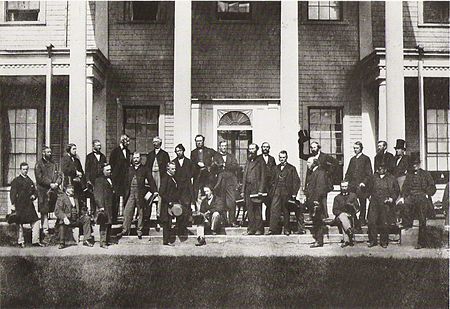Reading Log #10
- The main arguments of these readings are the views for and against Confederation in this time. These articles were written to show the reader different views people in different parts of Canada had when the idea of Confederation came into consideration. These readings shed light on our understanding of the Canadian past by showing us the different views and ideas of people about Confederation in this time. This argument is convincing because it shows us two different sides to the debate of Confederation, for it or against it, as well as reasons why people had their position on Confederation.
- Many parts of Canada opposed the idea of Confederation, such as New Brunswick, Nova Scotia, Prince Edward Island, and Newfoundland. These opposing ideas are shown in one of the documents, “No Confederation!”: “What is Confederation?… It is the giving up of all control over our valuable Fisheries… It is the giving up to Canada all our Lands, our Timber, our Mines and our Minerals, for a petty and insufficient consideration”[1]. Another opposing comment on Confederation would be that “New Brunswick’s economic trade pattern… had no economic ties with the Canadas”[2]. The population of Prince Edward Island “believed that Confederation would give them very little. Union would mean higher taxes to support the… railway… and higher tariffs to create interprovincial trade… neither would of which would greatly benefit Price Edward Island”[3].
Even though there were people who opposed Confederation, there were some that thought Confederation would be a good thing for Canada. It was presented “to French Canadians as their best hope for cultural survival in a world of limited possibilities”[4]. Many people believed in Confederation because they believed that “it will give increased prosperity to every trade and occupation, and secure for our children and their children a home worth living in, and one to be proud of… if we should be attacked, it will enable us to show a stronger front to the enemy”[5].
In addition to some opposing and others wanting confederation, a group of people who had no say in the development of Confederation was the First Nations people. “To the Fathers of Confederation, the First Nations were wards of the state, upon whom sovereignty could be imposed… ‘Aboriginal peoples were treated as subjects, not citizens, of the new dominion’”[6].
These readings contribute to the wider historiography on the topic because they give accounts of what people thought of in the time about Confederation and their reasonings. These readings give us a better understanding of why some places in Canada went into Confederation and others didn’t and how these decisions contributed to the overall history of Canada. These readings link to others we are reading because they deal with important aspects of the development of Canada as a country.
- How does the province of PEI, New Brunswick, Nova Scotia, and all the others who originally opposed the idea of Confederation feel now about their decisions? Do they feel like it was a good idea that they eventually joined in Confederation? Or do they think that long ago when they did join confederation it was a big mistake and they could have prospered without it?
Nowadays, how do the provinces feel about their decisions to join Confederation? Would they have changed any thing about their decision?
Was Confederation really a good idea?
Endnotes:
[1] “No Confederation!,” The Morning Chronicle (St. John’s), September 28, 1869, p. 1.
http://www.collectionscanada.gc.ca/confederation/023001-7124-e.html
[2] Responses to the Confederation Proposals, “Toward Confederation”, (n.d), p. 466.
[3] Response to the Confederation Proposals, p. 467.
[4] Response to the Confederation Proposals, p. 465.
[5] “The 1st of July,” Pictou Colonial Standard (Nova Scotia), July 2, 1867, p. 2.
http://www.collectionscanada.gc.ca/confederation/023001-7137-e.html
[6] Response to the Confederation Proposals, p. 464.
Bibliography:
*“Confederation and the People,” The Evening Times (Hamilton), November 21, 1864: p. 2. http://www.collectionscanada.gc.ca/confederation/023001-7147-e.html
*“No Confederation,” The Morning Chronicle (St. John’s), September 28, 1869: p. 1. http://www.collectionscanada.gc.ca/confederation/023001-7124-e.html
Responses to the Confederation Proposals, “Toward Confederation”, (n.d): p. 464-468.
*“The 1st of July,” Pictou Colonial Standard (Nova Scotia), July 2, 1867: p. 2. http://www.collectionscanada.gc.ca/confederation/023001-7137-e.html
*“The Botheration Scheme,” Halifax Morning Chronicle, January 11, 1865. http://www.collectionscanada.gc.ca/confederation/023001-7135-e.html
*“The New Dominion,” The Saint John Morning News, July 1, 1867: p. 2. http://www.collectionscanada.gc.ca/confederation/023001-7121-e.html
Links to the articles:
Responses to the Confederation Proposal: http://moodle.tru.ca/pluginfile.php/409677/mod_resource/content/1/Responses%20to%20the%20Confederation%20proposals.pdf
*Other online articles see the Bibliography
My reflection on the articles:
The reason I chose to add this reading log into my ePortfolio was because it dealt with yet another topic I find fascinating in Canadian History. Confederation has always been a topic I am continually drawn to learning more about because there is so many things going on in this time period. Such as Confederation as a whole and the conflicting ideas of the provinces to join Confederation or not, the construction of the transcontinental railway, the appointing of the first Prime Minister of the New Dominion, as will as many other things. These articles also contribute to the main purpose of my ePortfolio, which is, History is not just about facts and information, but the interpretation of others. With the “Collections of Canada” websites, they give insight on the people’s views on the idea of Confederation in this time, in the form of newspaper articles. All the interpretations of Confederation were different, which helps us, nowadays, to better understand the choices many provinces made when given the option of Confederation.
